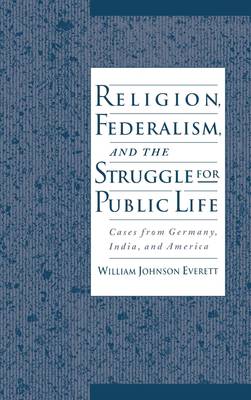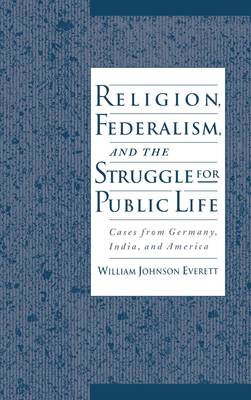
- Afhalen na 1 uur in een winkel met voorraad
- Gratis thuislevering in België vanaf € 30
- Ruim aanbod met 7 miljoen producten
- Afhalen na 1 uur in een winkel met voorraad
- Gratis thuislevering in België vanaf € 30
- Ruim aanbod met 7 miljoen producten
Zoeken
Religion, Federalism, and the Struggle for Public Life
Cases from Germany, India, and America
William Johnson Everett
Hardcover | Engels
€ 228,95
+ 457 punten
Omschrijving
In the past decade, the struggle for new forms of federal order and public life has exploded in central Europe, the former Soviet Union, and South Africa. Religious traditions and organizations have played a crucial role in these revolutions, and have also been critical to the establishment of constitutional orders in post-colonial countries like India. Moreover, they continue to undergird and to challenge the understanding of public life in the United States, whether in church-state conflicts or Native American religious claims. William Everett examines the role of religious traditions in the development of modern federal republicanism, seeking answers to such questions as: How have patterns of religious organization shaped federal republican orders? How do different cultures weave together these political and religious threads into a living fabric that fits their own cultural heritage? How are Western religious traditions of covenant and conciliarism relevant for understanding religion and constitutional developments in non-Western cultures? The author argues that a better comparative grasp of these dynamics is essential to our understanding of the establishment, sustenance, and development of federal republican governance. He presents, as a first step toward this goal, a detailed and comparative study of these patterns in India, Germany, and the United States.
Specificaties
Betrokkenen
- Auteur(s):
- Uitgeverij:
Inhoud
- Aantal bladzijden:
- 224
- Taal:
- Engels
Eigenschappen
- Productcode (EAN):
- 9780195103748
- Verschijningsdatum:
- 27/11/1997
- Uitvoering:
- Hardcover
- Formaat:
- Genaaid
- Afmetingen:
- 162 mm x 237 mm
- Gewicht:
- 526 g

Alleen bij Standaard Boekhandel
+ 457 punten op je klantenkaart van Standaard Boekhandel
Beoordelingen
We publiceren alleen reviews die voldoen aan de voorwaarden voor reviews. Bekijk onze voorwaarden voor reviews.







